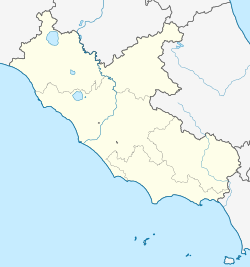Lucus Feroniae
This article needs additional citations for verification. (December 2014) |
 View of the archaeological site of Lucus Feroniae | |
| Location | Lazio, Italy |
|---|---|
| Region | Provincia di Roma |
| Coordinates | 42°07′48″N 12°35′48″E / 42.13000°N 12.59667°E |
| Type | Settlement |
| History | |
| Periods | Roman Republic Roman Empire |
| Cultures | Ancient Rome |
| Site notes | |
| Excavation dates | yes |
| Public access | yes |
Lucus Feroniae was an ancient sacred grove ("lucus") dedicated to the Sabine goddess Feronia. It was located in Etruria, across the ancient Via Tiberina, in what is now the territory of the modern commune of Capena, Lazio, next to the border with the neighbouring comune of Fiano Romano.[1]
It was visited both by Latins and Sabines even in the time of Tullus Hostilius and was plundered by Hannibal in 211 BCE. In Imperial times it became an independent community receiving a colony of Octavian's veterans (Colonia Iulia felix Lucoferensis) and possessing an amphitheatre, capable of housing up to 5,000 spectators, a basilica, a forum, baths and numerous other edifices. See Feronia (Etruria).
A museum houses parts of statues, some of them with interchangeable hands and heads, depending from the current emperor ruling.

The villa of the Volusii Saturnini is located nearby.[2][3][4]
See also
External links
- Gladiators Rescued from Tomb Raiders Lie Forgotten under Sheets
- Soprintendenza Beni Archeologici Etruria Meridionale Sito Istituzionale > AREE ARCHEOLOGICHE > Villa dei Volusii
References
- ^ Harris, W., DARMC, R. Talbert, S. Gillies, T. Elliott, J. Becker. "Places: 413184 (Lucus Feroniae)". Pleiades. Retrieved December 18, 2014.
{{cite web}}: CS1 maint: multiple names: authors list (link) - ^ Annalisa Marzano (2007). Roman Villas in Central Italy: A Social and Economic History. BRILL. pp. 181–. ISBN 90-04-16037-X.
- ^ Penelope Goodman (7 November 2006). The Roman City and Its Periphery: From Rome to Gaul. Routledge. pp. 52–. ISBN 978-1-134-30335-9.
- ^ http://www.etruriameridionale.beniculturali.it/index.php?it/188/descrizione

